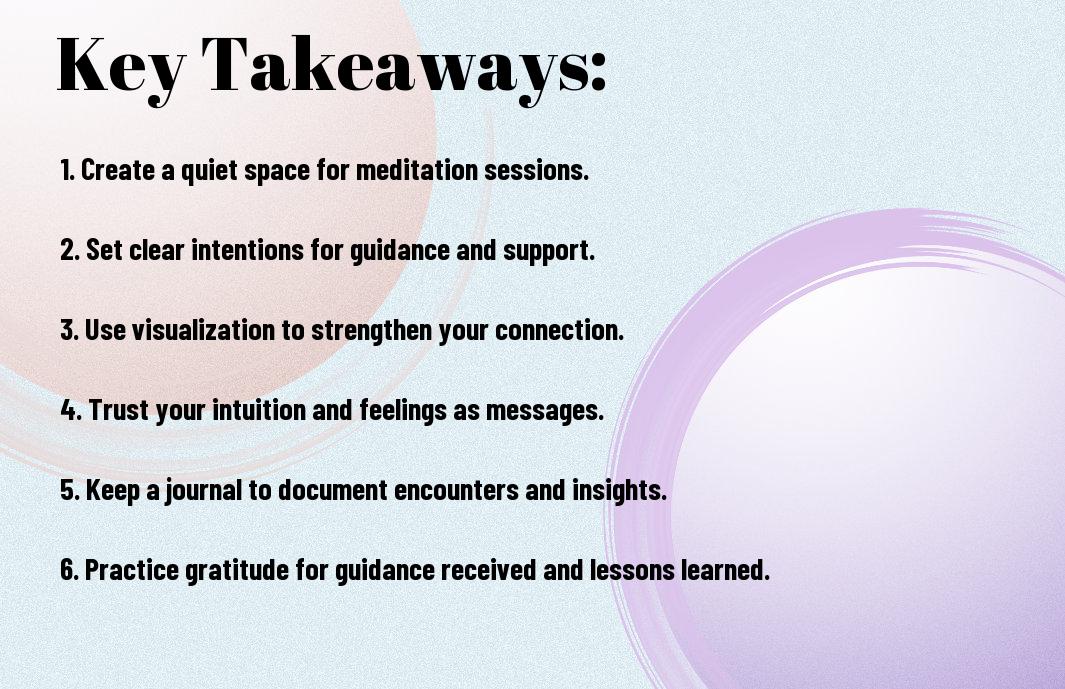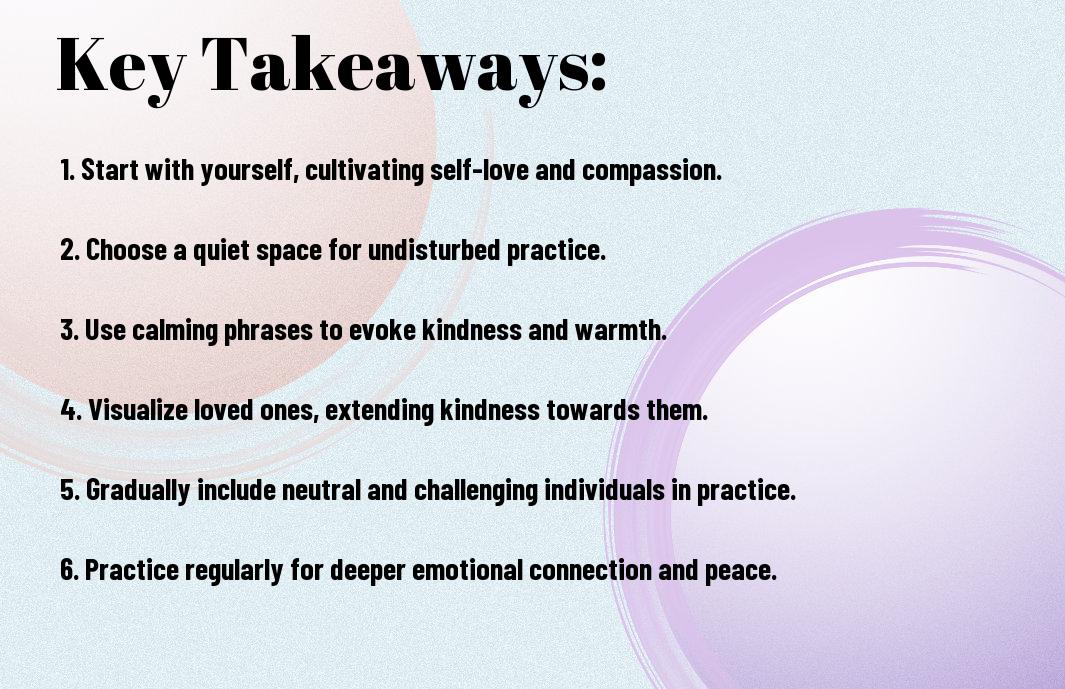It’s time to deepen your spiritual journey by connecting with your spirit guides, who serve as your divine support team. By tuning into their wisdom, you can receive guidance, insights, and clarity on your life’s path. This post will outline effective techniques and practices that will help you establish a connection with these ethereal allies, enabling you to trust in the supportive energy that surrounds you. Explore these methods to enhance your intuition and elevate your spiritual awareness today.
Key Takeaways:
- Intention: Set a clear intention to connect with your spirit guides, as this establishes the purpose of your communication.
- Meditation: Regular meditation helps quiet the mind, making it easier to receive messages and insights from your guides.
- Trust: Develop trust in the feelings, thoughts, or images that come to you, as they are signs from your spirit guides.
- Journaling: Keep a journal to document your experiences and interactions, which can provide clarity and deeper understanding.
- Ask Questions: Engage with your spirit guides by asking specific questions and being open to the answers that may come in unexpected forms.
Understanding Spirit Guides
To connect with your spirit guides effectively, it’s imperative to understand who they are and their significance in your spiritual journey. They can provide insight, guidance, and support, helping you navigate life’s challenges. For a deeper exploration of this topic, check out How to Connect With Your Spirit Guide.
Definition and Types
For you to connect meaningfully with your spirit guides, it helps to know their definitions and various types. Spirit guides can be defined as non-physical entities that assist you throughout your life, often embodying wisdom and knowledge. The following categories can help you identify which spirit guides may be present:
| Type of Guide | Description |
| Angels | Heavenly beings that offer protection and guidance. |
| Spirit Animals | Animal spirits that embody specific traits or lessons. |
| Ancestral Guides | Deceased relatives providing wisdom and support. |
| Ascended Masters | Highly evolved spiritual beings offering lessons. |
This classification aids in understanding who might be helping you on your spiritual path.
The Role of Spirit Guides in Our Lives
Behind every significant milestone or challenging situation in your life, your spirit guides are likely present, offering you support and guidance. Their role is multifaceted, providing insights to help you make pivotal decisions, instilling confidence during doubt, and guiding your spiritual growth.
Their presence can assist you in recognizing patterns, overcoming obstacles, and embracing opportunities for self-discovery. By fostering a connection with your spirit guides, you can tap into their wisdom and enhance your intuition, leading to a more fulfilling life path. Understanding this vital role can empower you to navigate your journey with greater clarity and purpose.
Preparing for Connection
Some preparation is crucial for a deep and meaningful connection with your spirit guides. This phase not only enhances your receptiveness but also sets the tone for a spiritually enriching experience. Taking time to ground yourself, clarify your objectives, and foster openness can significantly impact the quality of the guidance you receive. Embrace this opportunity as you begin on a transformative journey toward deeper self-awareness and connection.
Creating a Sacred Space
By creating a sacred space, you establish an environment conducive to spiritual communication. This can be a particular room, corner, or outdoor area where you feel safe and centered. Decorate your space with items that inspire you, such as crystals, candles, or meaningful symbols. Ensure it’s free of distractions so you can fully immerse yourself in the experience and invite your spirit guides in.
Setting Intentions
The process of setting intentions is key to guiding your connection with your spirit guides. By clearly defining what you hope to achieve or understand, you open a pathway for more focused communication. Intentions can range from seeking guidance on specific questions to simply inviting wisdom and support into your life.
And when you articulate your intentions, be as specific as possible. This clarity not only enhances your connection but also aligns your energies with the guidance you’re seeking. Write down your intentions to reinforce them and keep them close during your practice. As you meditate or engage with your spirit guides, holding these intentions in mind will help facilitate a more profound relationship based on mutual understanding and respect.
Techniques for Connecting
Once again, connecting with your spirit guides can be a deeply enriching experience. There are various techniques you can apply, each designed to foster a deeper sense of communion with your guides. Whether through meditative practices or the use of energetic tools, find what resonates with you and make it a regular part of your spiritual journey.
Meditation Practices
Techniques like mindfulness and guided meditations specifically aimed at connecting with your spirit guides are imperative. By quieting your mind and focusing inward, you create a sacred space where communication can flourish. Regular practice allows you to attune your energy, making it easier for your guides to reach you.
Using Crystals and Tools
Across various spiritual traditions, crystals and specialized tools are known to enhance your connection with spirit guides. These items can amplify your energy and create an inviting atmosphere for your guides to join you. Incorporating them into your practices can significantly deepen the bond you share with your guides.
And when choosing crystals, consider ones like clear quartz for clarity or amethyst for higher intuition. Tools like tarot cards and pendulums can also serve as conduits for guidance, offering insights that pave the way for clearer communication. As you explore these options, pay attention to how each resonates with you and your unique spiritual journey.
Recognizing Messages from Your Guides
For you to truly connect with your spirit guides, it’s crucial to learn how to recognize the messages they send. These messages often manifest in various forms, including signs, symbols, and intuitive thoughts that guide your decisions and affirm your path. By developing an awareness of these communications, you can deepen your connection and better understand the support they offer in your spiritual journey.
Signs and Symbols
At times, you may notice specific signs or symbols that seem to appear repeatedly in your life. These can range from a particular animal crossing your path, to numbers you keep encountering. Pay attention to these phenomena, as they often carry deeper meanings and are intended to guide you on your journey.
Intuitive Feelings and Thoughts
From these signs, you might start to experience intuitive feelings and thoughts that feel particularly strong or relevant to your situation. These insights often arise suddenly and can be accompanied by a sense of clarity or reassurance about the choices you need to make.
It is in these moments that you should take heed; your guides often communicate through your intuition. Trust the feelings and thoughts that arise, as they may point you towards the right direction or provide you with the guidance you seek. By honing this awareness, you empower yourself to follow your inner voice, which is frequently aligned with your spirit guides’ messages.
Building a Relationship with Your Spirit Guides
Despite the ethereal nature of spirit guides, establishing a meaningful relationship with them is attainable. Engaging in regular meditation, setting intentions, and being open to signs in your daily life can enhance your connection. Approach this relationship with curiosity and patience, as understanding often unfolds gradually. Allow yourself to explore different methods of communication, such as journaling or dream interpretation, creating a deeper bond with these guiding energies.
Consistency and Commitment
On your journey to connect with your spirit guides, consistency and commitment are vital. By dedicating a specific time each day to practice meditation or mindfulness, you foster a reliable channel for communication. The more you engage with your guides, the stronger your connection becomes, making it easier to receive their messages and insights.
Trusting the Process
About establishing a relationship with your spirit guides, embracing the journey is imperative. Each person’s experience is unique, and it’s important to trust that the process is unfolding as it should. Allow space for growth and exploration, recognizing that some days may feel more connected than others.
This approach requires patience and an open heart. Your spirit guides may not always communicate in clear, direct ways, and it’s natural to feel uncertain at times. By trusting in the process, you create an environment of receptivity, allowing the messages and guidance to flow naturally. Embrace each experience as a progressive step in your spiritual journey.

Addressing Common Challenges
Not everyone finds it easy to connect with their spirit guides. You may encounter a variety of challenges along the way, from skepticism to external distractions. Recognizing and addressing these barriers is vital for establishing a strong connection with your guides and enhancing your spiritual journey. Embracing the process with patience and understanding will strengthen your bond with your guides and improve your overall experience.
Overcoming Doubt and Fear
One of the primary challenges you may face is doubt and fear regarding the messages and guidance you receive. It’s important to acknowledge these feelings as a natural part of your spiritual journey. Trust and belief in yourself and your intuition will gradually ease these concerns, allowing you to open up to the wisdom of your spirit guides.
Dealing with Distractions
With distractions all around you, it can be challenging to focus and connect with your spirit guides effectively. Your environment, technology, and even your own thoughts may disrupt your attempts at communication. Taking the time to create a peaceful space for your practice can help mitigate these distractions and strengthen your connection.
Indeed, establishing a distraction-free environment is vital for enhancing your spiritual connection. You can achieve this by turning off electronic devices, decluttering your space, and incorporating calming elements, such as candles, crystals, or soothing music. Prioritizing a specific time for your practice will also signal to your mind that it’s time to focus, allowing you to better connect with your spirit guides unencumbered by external noise or interruptions.

To wrap up
On the whole, connecting with your spirit guides can be a transformative journey that enhances your life in numerous ways. By practicing mindfulness, setting clear intentions, and remaining open to signs and messages, you can strengthen your relationship with these spiritual allies. Engaging in meditation and journaling can further facilitate this connection. For more insights, check out this guide on How To Connect To Spirit Guides to deepen your understanding and experience.
FAQ
Q: How can I begin to connect with my spirit guides?
A: To initiate a connection with your spirit guides, start by creating a quiet and comfortable environment where you can relax without distractions. Meditation is a powerful tool; find a comfortable position, close your eyes, and focus on your breath. Set the intention to connect with your spirit guides and invite them into your space. Visualization techniques can also be helpful; imagine a light surrounding you or envision your guides approaching you. Journaling about your experiences and feelings during these sessions can deepen your connection and provide insights over time.
Q: What signs should I look for to know my spirit guides are communicating with me?
A: Spirit guides communicate in various ways, and being open to different signs is helpful. Look for synchronicities, such as repeatedly seeing certain numbers or symbols that resonate with you. You might also experience sudden insights, dreams, or feelings that guide your decisions. Some people report feeling a gentle presence or a shift in energy around them. Trust your intuition; if you feel drawn to certain messages or experiences, it could be your spirit guides trying to connect with you.
Q: Can anyone connect with their spirit guides?
A: Yes, anyone can connect with their spirit guides regardless of their background or experience level. It often requires patience and an open heart. Begin by nurturing your intuition and being receptive to subtle feelings or thoughts. Engaging in practices such as meditation, journaling, or energy work can strengthen your connection. Each person’s experience may vary, so allow your journey to unfold naturally without pressure. Remember that your spirit guides are always with you, ready to assist whenever you seek that connection.




